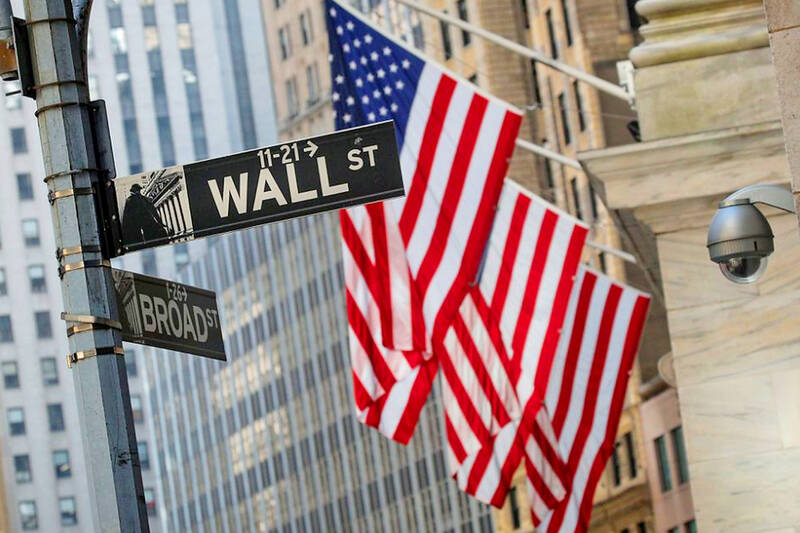A US congressional committee on China is to hold a war game simulating a Chinese invasion of Taiwan with financial and business executives in New York to show the risks of investing in China, the Financial Times reported yesterday.
US House Select Committee on the Strategic Competition Between the United States and the Chinese Communist Party Chairman Mike Gallagher and US Representative Raja Krishnamoorthi are tomorrow to lead the simulation, the newspaper said, citing an unnamed source close to the committee.
The participants are to include representatives from investment banks, current and former pharmaceutical company executives, and retired high-ranking US military officers, the Financial Times said.

Photo: Reuters
The panel is expected to meet Wall Street executives to scrutinize how potential US investment in China could harm US national security.
On Tuesday, they are to hold a hearing that would include testimony from former US Securities and Exchange Commission chairman Jay Clayton and investment manager Jim Chanos.
The Financial Times quoted the source as saying that the lawmakers wanted comments from the financial community about “the systemic risks that come with American capital flowing to China and how banks and other financial institutions think about their investments in China and exposure to the Chinese economy in the event of a political crisis.”
The war game is to explore the economic ramifications of a conflict between the US and China over Taiwan.
The US representatives in April attended a war game in Washington that “raised questions about whether the US and its allies were doing enough to prepare for sanctions on China and an economic war with Beijing,” the Financial Times said.
Earlier this year, the committee met Apple chief executive officer Tim Cook and Disney chief executive officer Bob Iger in several discussions that showed that Hollywood and Silicon Valley entrepreneurs underestimate the risk of war in Taiwan, Gallagher told the Financial Times.
Krishnamoorthi was quoted as saying that it was “important that our committee hear from the financial industry about how [Chinese Communist Party] policies are affecting Americans’ savings and investments and what Congress needs to do to help protect American investors and our national security.”
The bipartisan committee was established in January to assess and manage the national security threat posed by China. It has also addressed issues such as Beijing’s predatory economic practices and human rights transgressions.

INVESTIGATION: The case is the latest instance of a DPP figure being implicated in an espionage network accused of allegedly leaking information to Chinese intelligence Democratic Progressive Party (DPP) member Ho Jen-chieh (何仁傑) was detained and held incommunicado yesterday on suspicion of spying for China during his tenure as assistant to then-minister of foreign affairs Joseph Wu (吳釗燮). The Taipei District Prosecutors’ Office said Ho was implicated during its investigation into alleged spying activities by former Presidential Office consultant Wu Shang-yu (吳尚雨). Prosecutors said there is reason to believe Ho breached the National Security Act (國家安全法) by leaking classified Ministry of Foreign Affairs information to Chinese intelligence. Following interrogation, prosecutors petitioned the Taipei District Court to detain Ho, citing concerns over potential collusion or tampering of evidence. The

‘FORM OF PROTEST’: The German Institute Taipei said it was ‘shocked’ to see Nazi symbolism used in connection with political aims as it condemned the incident Sung Chien-liang (宋建樑), who led efforts to recall Democratic Progressive Party (DPP) Legislator Lee Kun-cheng (李坤城), was released on bail of NT$80,000 yesterday amid an outcry over a Nazi armband he wore to questioning the night before. Sung arrived at the New Taipei City District Prosecutors’ Office for questioning in a recall petition forgery case on Tuesday night wearing a red armband bearing a swastika, carrying a copy of Adolf Hitler’s Mein Kampf and giving a Nazi salute. Sung left the building at 1:15am without the armband and apparently covering the book with a coat. This is a serious international scandal and Chinese

Seventy percent of middle and elementary schools now conduct English classes entirely in English, the Ministry of Education said, as it encourages schools nationwide to adopt this practice Minister of Education (MOE) Cheng Ying-yao (鄭英耀) is scheduled to present a report on the government’s bilingual education policy to the Legislative Yuan’s Education and Culture Committee today. The report would outline strategies aimed at expanding access to education, reducing regional disparities and improving talent cultivation. Implementation of bilingual education policies has varied across local governments, occasionally drawing public criticism. For example, some schools have required teachers of non-English subjects to pass English proficiency

TRADE: The premier pledged safeguards on ‘Made in Taiwan’ labeling, anti-dumping measures and stricter export controls to strengthen its position in trade talks Products labeled “made in Taiwan” must be genuinely made in Taiwan, Premier Cho Jung-tai (卓榮泰) said yesterday, vowing to enforce strict safeguards against “origin laundering” and initiate anti-dumping investigations to prevent China dumping its products in Taiwan. Cho made the remarks in a discussion session with representatives from industries in Kaohsiung. In response to the US government’s recent announcement of “reciprocal” tariffs on its trading partners, President William Lai (賴清德) and Cho last week began a series of consultations with industry leaders nationwide to gather feedback and address concerns. Taiwanese and US officials held a videoconference on Friday evening to discuss the